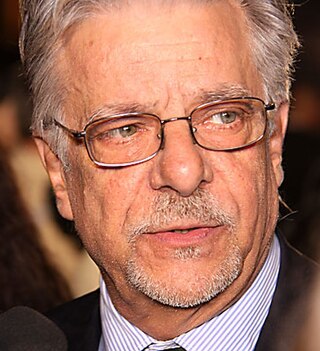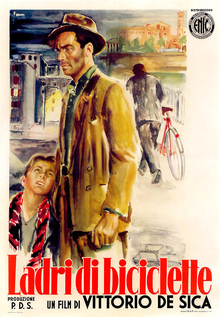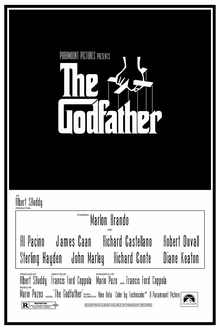
The cinema of Italy comprises the films made within Italy or by Italian directors. Since its beginning, Italian cinema has influenced film movements worldwide. Italy is one of the birthplaces of art cinema and the stylistic aspect of film has been one of the most important factors in the history of Italian film. As of 2018, Italian films have won 14 Academy Awards for Best Foreign Language Film as well as 12 Palmes d'Or, one Academy Award for Best Picture and many Golden Lions and Golden Bears.

Italy, officially the Italian Republic, is a country in Southern and Western Europe. It consists of a peninsula that extends into the Mediterranean Sea, with the Alps on its northern land border, as well as nearly 800 islands, notably Sicily and Sardinia. Italy shares its borders with France, Switzerland, Austria, Slovenia, and two enclaves: Vatican City and San Marino. It is the tenth-largest country in Europe by area, covering 301,340 km2 (116,350 sq mi), and the third-most populous member state of the European Union, with a population of nearly 60 million. Italy's capital and largest city is Rome; other major urban areas include Milan, Naples, Turin, Palermo, Bologna, Florence, Genoa, and Venice.

Martin Charles Scorsese is an American filmmaker. He emerged as one of the major figures of the New Hollywood era. He has received many accolades, including an Academy Award, four BAFTA Awards, three Emmy Awards, a Grammy Award, and three Golden Globe Awards. He has been honored with the AFI Life Achievement Award in 1997, the Film Society of Lincoln Center tribute in 1998, the Kennedy Center Honor in 2007, the Cecil B. DeMille Award in 2010, and the BAFTA Fellowship in 2012. Four of his films have been inducted into the National Film Registry by the Library of Congress as "culturally, historically or aesthetically significant".

The spaghetti Western is a broad subgenre of Western films produced in Europe. It emerged in the mid-1960s in the wake of Sergio Leone's filmmaking style and international box-office success. The term was used by foreign critics because most of these Westerns were produced and directed by Italians.

Roberto Remigio Benigni is an Italian actor, comedian, screenwriter and director. He gained international recognition for writing, directing and starring in the Holocaust comedy-drama film Life Is Beautiful (1997), for which he received the Academy Awards for Best Actor and Best International Feature Film. Benigni was the first actor to win the Best Actor Academy Award for a non–English language performance.

Italian neorealism, also known as the Golden Age of Italian Cinema, was a national film movement characterized by stories set amongst the poor and the working class. They are filmed on location, frequently with non-professional actors. They primarily address the difficult economic and moral conditions of post-World War II Italy, representing changes in the Italian psyche and conditions of everyday life, including poverty, oppression, injustice and desperation. Italian Neorealist filmmakers used their films to tell stories that explored the contemporary daily life and struggles of Italians in the post-war period. Italian neorealist films have become explanatory discourse for future generations to understand the history of Italy during a specific period through the storytelling of social life in the context, reflecting the documentary and communicative nature of the film. Some people believe that neorealistic films evolved from Soviet montage films. But in reality, compared to Soviet filmmakers describing the people's opposition to class struggle through their films, neorealist films aim to showcase individuals' resistance to reality in a social environment.

The Sopranos is an American crime drama television series created by David Chase. The series revolves around Tony Soprano, a New Jersey-based Italian-American mobster who struggles to balance his family life with his role as the leader of a criminal organization, which he reluctantly explores during therapy sessions with psychiatrist Jennifer Melfi. The series also features Tony's various family members, Mafia colleagues, and rivals in prominent roles—most notably his wife Carmela and his protégé and distant cousin Christopher Moltisanti.

Giancarlo Giannini is an Italian actor and voice actor. He won the Cannes Film Festival Award for Best Actor for his performance in Love and Anarchy (1973) and received an Academy Award nomination for Seven Beauties (1975). He is also a four-time recipient of the David di Donatello Award for Best Actor.

Claude Joséphine Rose CardinaleCavaliere di Gran Croce dell'OMRI, known as Claudia Cardinale, is a Tunisian-Italian actress.

Monica Anna Maria Bellucci is an Italian actress and model who began her career as a fashion model before working in Italian, American, and French films. She has an eclectic filmography in a range of genres and languages, and her accolades include the David di Donatello, Globo d'oro and Nastro d'Argento awards. In 2018, Forbes Italy included her in their list of the 100 most successful Italian women.

Asia Argento is an Italian actress and filmmaker. The daughter of filmmaker Dario Argento, she has had roles in several of her father's features and achieved mainstream success with appearances in XXX (2002), Land of the Dead (2005) and Marie Antoinette (2006). Her other notable acting credits include Queen Margot (1994), Let's Not Keep in Touch (1994), Traveling Companion (1996), Last Days (2005) and Islands (2011). Argento is the recipient of several accolades, including two David di Donatello awards for Best Actress and three Italian Golden Globes. Her directorial credits include The Heart Is Deceitful Above All Things (2004) and Misunderstood (2014).

Bicycle Thieves, also known as The Bicycle Thief, is a 1948 Italian neorealist drama film directed by Vittorio De Sica. It follows the story of a poor father searching in post-World War II Rome for his stolen bicycle, without which he will lose the job which was to be the salvation of his young family.

Italian futurist cinema was the oldest movement of European avant-garde cinema. Italian futurism, an artistic and social movement, impacted the Italian film industry from 1916 to 1919. It influenced Russian Futurist cinema and German Expressionist cinema. Its cultural importance was considerable and influenced all subsequent avant-gardes, as well as some authors of narrative cinema; its echo expands to the dreamlike visions of some films by Alfred Hitchcock.

The Godfather is a 1972 American epic gangster film directed by Francis Ford Coppola, who co-wrote the screenplay with Mario Puzo, based on Puzo's best-selling 1969 novel. The film stars an ensemble cast including Marlon Brando, Al Pacino, James Caan, Richard Castellano, Robert Duvall, Sterling Hayden, John Marley, Richard Conte and Diane Keaton. It is the first installment in The Godfather trilogy, chronicling the Corleone family under patriarch Vito Corleone (Brando) from 1945 to 1955. It focuses on the transformation of his youngest son, Michael Corleone (Pacino), from reluctant family outsider to ruthless mafia boss.

The Italian Job is a 2003 American heist action film directed by F. Gary Gray and starring an ensemble cast consisting of Mark Wahlberg, Charlize Theron, Edward Norton, Jason Statham, Seth Green, Mos Def, and Donald Sutherland. Inspired by the 1969 British film, but with an original story, the plot follows a motley crew of thieves who plan to steal gold from a former associate who double-crossed them. Despite the shared title, the plot and characters of this film differ from its source material; Gray described the film as "an homage to the original."
A list of some notable films produced in the Cinema of Italy ordered by year and decade of release For an alphabetical list of articles on Italian films see Category:Italian films.

The cinema of Yemen is relatively obscure, but it has seen glimpses of influence and representation throughout the years. Since the 1920s, when expeditions from Europe arrived in Yemen, the country has been featured in various documentaries and travelogues. These early films introduced audiences to the landscapes, architecture, and culture of Yemen, providing a window into a world they might not have otherwise experienced.

Matteo Garrone is an Italian filmmaker.

The Italian Job is a 1969 British comedy caper film written by Troy Kennedy Martin, produced by Michael Deeley, directed by Peter Collinson, and starring Michael Caine. The film's plot centres on Cockney criminal Charlie Croker, recently released from prison, who forms a gang for the job of stealing a cache of gold bullion being transported through the city of Turin, Italy, in an armoured security truck.



















